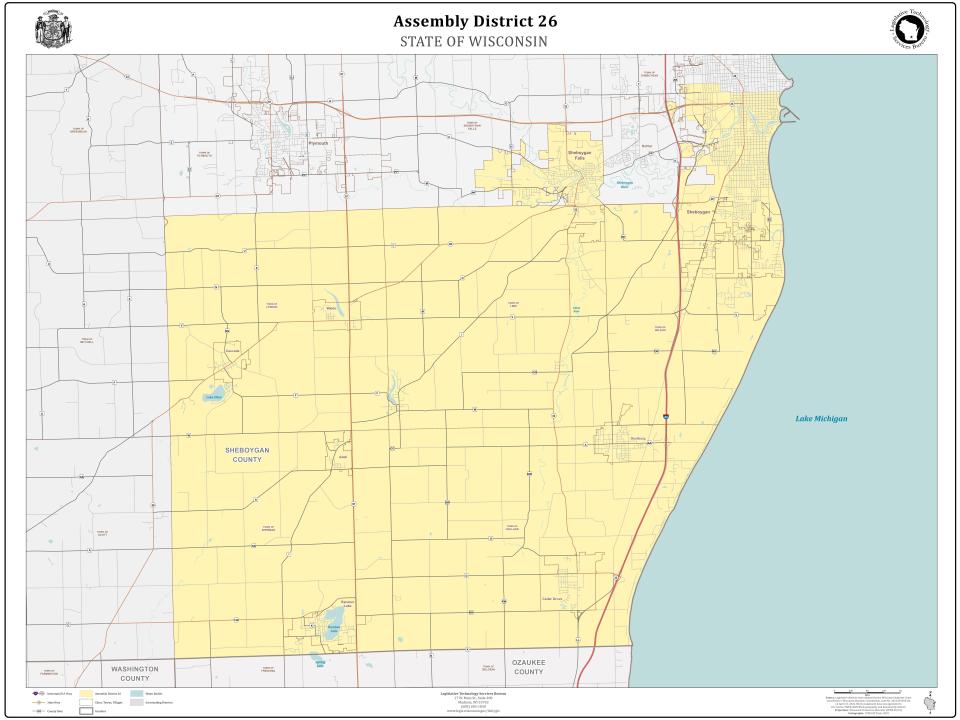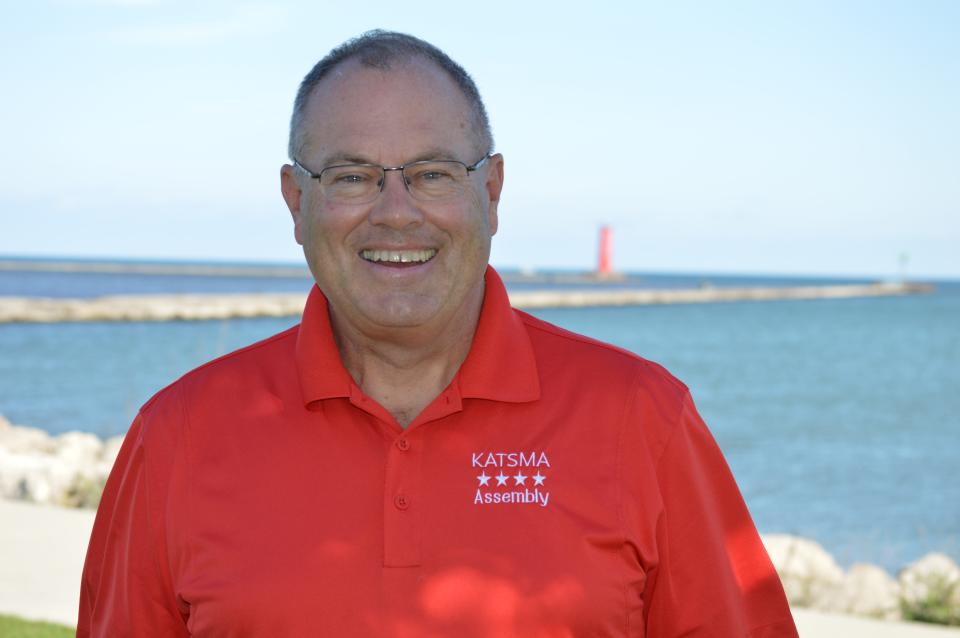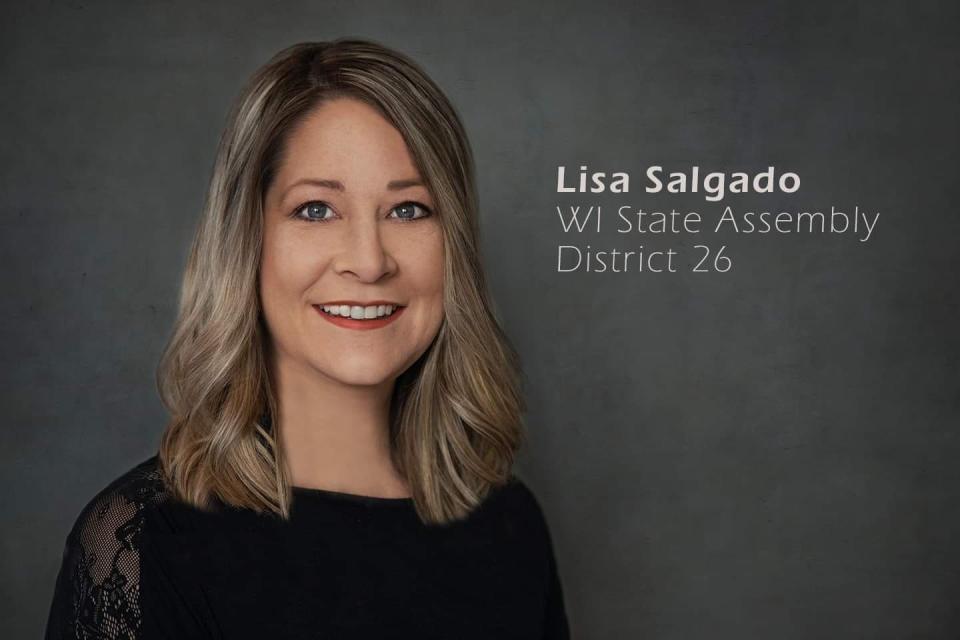Sheboygan County candidates for Wisconsin Assembly District 26 discuss election integrity, inflation, climate change and more
- Oops!Something went wrong.Please try again later.
SHEBOYGAN - State Rep. Terry Katsma, a former banker, will face medical worker Lisa Salgado for the 26th Assembly District seat in the Nov. 8 election.
Katsma, running for a fifth two-year term, was first elected to the position in 2014. If elected, this would be Salgado's first position in public office.
Katsma's campaign has received and spent dramatically more money than Salgado's, according to campaign finance reports for both candidates.
From the beginning of 2021 through August 2022, Katsma received more than $50,000 in campaign contributions, including donations of $1,000 or more from Charter Communications Inc. and Wisconsin Beer Distributors.
Salgado — whose campaign has only collected and spent donations since she became a candidate this spring — has received about $6,250 in campaign contributions, including donations of $1,000 or more from the Wisconsin Education Association Council and the Democratic Party of Wisconsin.
Katsma has spent $31,400 on the campaign since January 2021 compared to Salgado’s $2,900 in expenditures this year, according to their reports.
The 26th Assembly District includes part of the City of Sheboygan, Sheboygan Falls, Random Lake, Adell, Cedar Grove, Oostburg, Lima, Holland, Sherman and Wilson.
The Sheboygan Press asked each candidate to fill out a questionnaire before the election explaining why they are running and their positions on issues. Some responses were lightly edited for clarity.
For information about registering to vote and polling locations, visit myvote.wi.gov.

Meet the candidates

Name: Terry Katsma
Age: 64
Address: Erie Avenue, Oostburg
Occupation: State legislator
Highest educational attainment: Master of Business Administration from Marquette University
Campaign website: Terry Katsma for State Assembly on Facebook and www.TerryKatsma.com
Relevant experience: I have served four (two-year) terms in the state Assembly, and have served the last two terms on the Joint Committee on Finance, the committee charged with preparing the state budget and creating tax policy. Prior to my service in the Legislature, I was employed at a local community bank for more than 30 years, structuring loans and helping people meet their financial goals and dreams. I’ve been blessed to be married over 40 years, with three children and six grandchildren. I’m a lifelong resident of Sheboygan County, which has provided me with many life experiences necessary to reflect the community of Sheboygan County at the State Capitol.

Name: Lisa Salgado
Age: 50
Address: N. Fourth St., Sheboygan
Occupation: Medical assistant
Highest educational attainment: Technical college
Campaign website: Lisa Salgado WI State Assembly District 26 on Facebook and lisa4assembly.org
Relevant experience: I have been a medical assistant for the past 30 years. I hear our residents' concerns and help them find the resources they need. I have also been a supervisor, frontline worker during the pandemic and an employee health nurse. I am also a small business owner. Health issues are a big area of concern for our residents from affordable health care, access to mental health services, personal medical freedoms, and full funding for our schools with support for our teachers. I will work hard to make sure that our state budget and legislation reflects our values.
Why are you running for State Assembly?
Katsma: I am a firm believer in limited government, free markets and federalism (state’s rights). Residents of Sheboygan County are interested in a state government that is efficient, effective and accountable. I know that I am answerable to the roughly 58,000 residents of the 26th Assembly District. I want to make the State of Wisconsin and Sheboygan County a better place to work, live and play for my children and grandchildren.
Salgado: It is time for a change. I represent the working class and I will not be paid off by big corporations. I will fight for personal freedoms and privacy. Drug prices are high because the middleman is price gouging. I will pass legislation that will provide patients with transparency, prohibit the co-pay from being larger than the cost of the cash price of the medication and streamline the process. I will cap insurance deductibles to a price that people can afford. I am a strong advocate that knows the importance of community and that we are better together.
What makes you the best candidate in this race?
Katsma: Many candidates make promises or claim that they will change this or that when they are elected. I have a proven track record of reasonable and responsible leadership in the Assembly as noted by my appointment to represent my caucus on the Joint Committee on Finance. In addition, I have earned the respect of members of the opposite party. My staff and I provide consistent, meaningful constituent relations; for instance, we have advocated for hundreds of constituents since 2020 who encountered severe delays receiving their professional licenses or unemployment compensation from the Evers administration.
Salgado: People are tired of politics as usual and are ready for a change. They are ready to vote for a candidate who will listen to them and work hard to serve their needs, and not just vote along party lines. With my leadership and understanding of the complex public health and economic challenges that we face, I will be a strong advocate for my community. I believe that there is more that unites us than divides us, and that we need to have a dialogue to find common ground so we can build a better future that benefits all of us.
What is the most pressing issue facing Wisconsin, and how would you address it?
Katsma: Here are three:
Election integrity. Last session, I supported numerous election integrity bills — including prohibiting private dollars going to local governments to influence elections — unfortunately, Governor Evers blocked these ideas.
Tax relief. Last session, I authored one of the biggest middle-class tax cuts in state history and I think we can work to provide relief to those getting hammered the hardest by runaway inflation by reducing taxes again next year.
K-12 education. Parents and grandparents are demanding new educational options for K-12 students. I think we need to work with families to find the best opportunities for Wisconsin kids.
Editor's note: Both Democratic and Republican politicians called 2021 tax cuts among the largest in state history. The 2021 state budget, written by Republican representatives including Katsma and signed by Gov. Tony Evers, reduced taxes for about half of Wisconsin residents, including single filers making between about $24,000 to $267,000 per year or married-joint filers making between about $32,000 to $356,000 per year. About three-quarters of the cuts in income taxes will go to those making $100,000 or more a year.
Salgado: According to polls, Wisconsinites list climate change as their No. 1 concern. Without a safe place to live, clean water and food to eat, nothing else matters. We must protect the Great Lakes and our environment. We need to hold big polluting companies responsible for the cleanup and not have taxpayers foot the bill. We need to end fossil fuel subsidies and switch to green energy. Oil companies try to scare people about the cost of switching to green energy, but the cost is far greater by continuing to damage our environment and ignore the problem. Climate change impacts everyone's life in Wisconsin.
Would you support policy initiatives to address the impact of climate change in Wisconsin? If so, what would be your priorities? If not, please explain.
Katsma: Geologic studies have shown the climate to be changing over past decades, centuries and millennia. Locally, we observe the predictable rising and falling of Lake Michigan water levels. We need to be very careful if government thinks it can control the climate. Meanwhile, the data show that Sheboygan County residents and businesses have made great strides doing our part for the environment; we have made some progress in my eight years, but not enough progress, in convincing the federal government to stop punishing Sheboygan County for the pollution that drifts to our area from Illinois and Indiana.
Salgado: Some areas of Sheboygan County have lead and PFAS in the water. We need more state funding to make our water safe. Sheboygan County fails to meet national standards for ozone pollution levels. In an annual air quality report for 2021, the city of Sheboygan was listed as 23rd across the nation with the worst ozone pollution from 2017 to 2019. We need more local control over legislation regarding our natural resources. Currently, counties cannot go beyond what the state regulations are to safeguard their natural resources and environment.
More: Sheboygan County's lakeshore air quality is improving, but still doesn't meet EPA ozone standards
What should Wisconsin do to protect the democratic process and ensure the integrity of its elections?
Katsma: Our strong “Voter ID” law made a huge difference in improving voting integrity over the past decade; it has withstood a host of lawsuits and has proved to be an excellent tool for deterring and detecting cheaters. Now, we need to resist federal government efforts to take over elections or block us from continuing to enforce this good law. Elections are best administered locally, with local clerks, local poll workers and local observers. Private money, administered by local governments to influence election outcomes, should be prohibited. The integrity of voting absentee must be strengthened.
Salgado: To ensure that elections are fair, there needs to be transparency. We need to elect officials that will make election integrity the utmost importance. Democracy depends on ease of voting, access to voter registration and rules on political campaigning. We need to fight voter suppression laws. Many districts are heavily gerrymandered, including my own, and we need to elect legislators who are committed to supporting drawing reasonable district lines that ensure fair and equal representation of all citizens.
Would you vote to uphold the current abortion ban in Wisconsin, vote to add exemptions to the law or vote to repeal the law? Please explain your position.
Katsma: I support the U.S. Supreme Court’s finding in Dobbs that decisions affecting unborn children are best left to the people in each state. I believe all life is precious and that it is a key function of government to protect those most defenseless among us. I have supported efforts to advance and encourage fostering and adopting children at risk. I appreciate having earned repeated endorsements from our state’s pro-life organizations. I look forward to debating this issue to come up with a solution honoring life.
Salgado: The current abortion law puts the lives of women at risk and needs to be repealed. A woman's body should not be regulated by the government and should be a personal decision between a woman and her doctor. There are so many different medical issues such as ectopic pregnancies, heart and kidney issues, cancer during pregnancy, rape and the age of the woman that will not be addressed with Wisconsin's law from 1849. Also, contraception must be safeguarded. When the Affordable Care Act required insurance companies to provide free birth control, abortion rates plummeted.
How should state government help Wisconsin residents combat the effects of inflation?
Katsma: There is very little the state government can do to combat inflation because your state government isn’t causing it. The federal government has poured gasoline on the fire by printing trillions of dollars it doesn’t have; attacking everyone who fuels a home or a car; and giving taxpayer-funded handouts to their favorite voters. In contrast, your state government is constitutionally required to live within its means, according to a balanced budget, with no deficit spending allowed. I am committed to continuing the responsible, realistic leadership that Wisconsin Republicans have been delivering for more than a decade.
Salgado: Inflation is a worldwide problem. Wisconsin can create jobs by investing in green energy projects, and provide tax credits, which in turn tackles climate change, reduces carbon emissions and lowers utility bills. Health care debt is a huge problem, since 41% of U.S. adults currently have some type of debt as a result of medical or dental bills and struggle to pay premiums and deductibles. We can provide more tax credits for medical bills, lower the cost of deductibles and medication costs. We can make sure that big corporations pay their fair share of taxes.
Are the schools in your district properly funded? Please explain your position.
Katsma: There are five public school districts in the 26th Assembly District: Sheboygan, Sheboygan Falls, Cedar Grove-Belgium, Oostburg and Random Lake. I meet regularly with their superintendents, and there is more money reaching the classrooms today than ever before. In fact, K-12 funding is already the single largest spending component of state government; every budget I have voted for has increased funding for K-12 education. However, we have seen recently that public funding isn’t the only key to student achievement; parents today need options for connecting their kids with education that works for them.
Editor’s note: Recent budgets have increased state aid to schools, though less than other states, and the 2021-2023 budget included no increases in per-pupil state aid — which leads to decreased general aid for districts with declining enrollment. Republican representatives controlling the budget-writing committee significantly reduced the increases for K-12 funding proposed by Gov. Tony Evers.
Salgado: Wisconsin public schools only receive state funding to cover less than 30% of costs for children with disabilities, while special-needs vouchers for private schools are fully funded out of the state education budget. Public schools also lose funding in their budget because it is instead funneled to private schools through school vouchers and the special-needs vouchers. As a result, public school districts must fill the gap with general education resources, leaving fewer available to serve all students and creating inequities between districts throughout the state. It's time to create a more equitable funding system that ensures all schools have the funding they need for each student.
What should state government do about gun violence and crime in Wisconsin?
Katsma: We have a wide array of weapons laws in place already at every level of government, yet crime is increasing at an alarming rate. Law enforcement funding cannot be reduced. Prosecutors and judges cannot take a lenient approach to offenders. Safety is a primary function of government.
Salgado: One, no notoriety protocols. Hold media and social media companies accountable for their content. Do not give names or pictures of the perpetrator.
Two, universal background checks. Fix loopholes (currently no background checks are done on the gray market such as at gun shows, internet sales or sales person to person).
Other solutions include waiting periods, magazine limits, laws for storing guns locked and unloaded, permit-to-purchase certain firearms, reinstating the 1994 Assault Weapons Ban, getting money and lobbyists of gun and ammo companies out of politics, promoting anonymous tip lines, investing in intervention programs and increasing access to mental health services that are affordable.
How to vote
To vote, people must be registered and present a photo ID. People can register to vote online at myvote.wi.gov, in person at their municipal clerk's office or at the polling place the day of the election.
In-person voting will take place from 7 a.m. to 8 p.m. Nov. 8.
People must vote at the polling location of the ward in which they live. As a result of redistricting, some wards have changed. People can find their voting location at myvote.wi.gov or by calling their municipal clerk's office.
Reach Maya Hilty at 920-400-7485 or MHilty@sheboygan.gannett.com. Follow her on Twitter at @maya_hilty.
This article originally appeared on Sheboygan Press: Sheboygan County candidates for Assembly District 26 discuss issues

